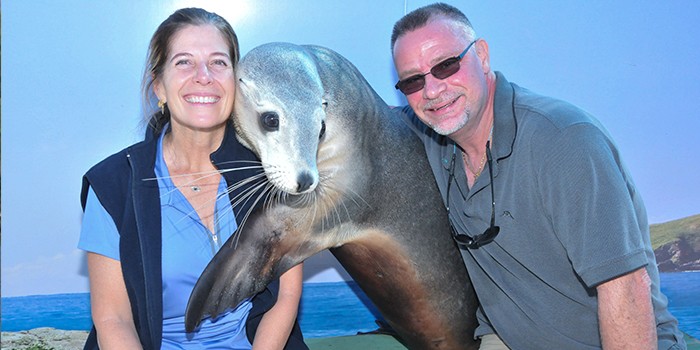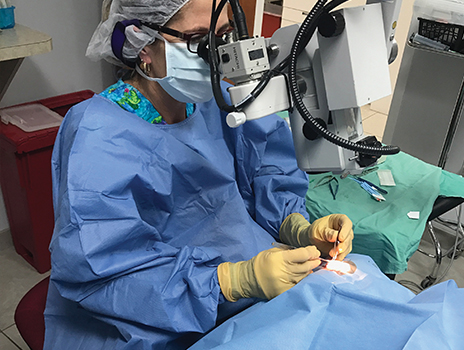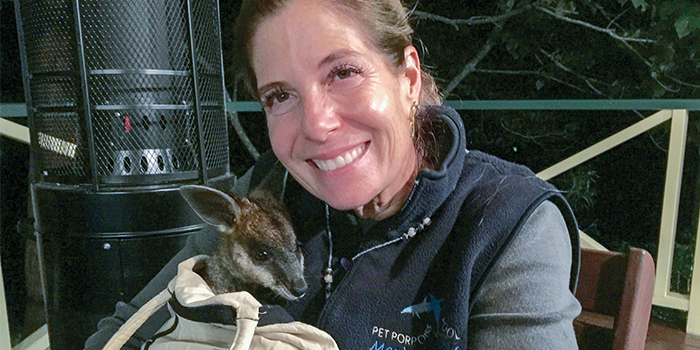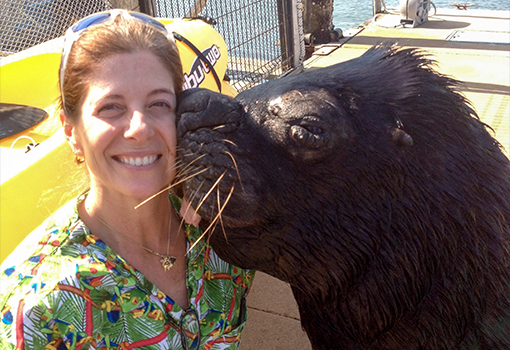Niche Digital Media Corporation
- 561-356-5572
- email us
- Tequetsa, Florida, United States


JUPITER, FL – October 31, 2017 – How’s your vision? Have you been to the eye doctor lately? Hopefully it’s 20/20, but what about your pet’s sight? Do you know the status of their vision or do you just assume they are seeing fine? Just as people must go to the doctor to get checkups, so do animals, regardless of their size or species. In our seaside town, we are lucky enough to be home to one of the top veterinary ophthalmologists in the world who keeps these beloved creatures healthy, Dr. Carmen Colitz DVM, PhD, Diplomate ACVO. Having practiced for over 21 years, she has traveled from the terrains of Australia to the cobalt seas of Dubai, examining or performing eye surgeries on animals of all natures.
Before Dr. Colitz earned her spot on the world map as an elite veterinary ophthalmologist, she claims she always knew she wanted to be a veterinarian, and that passion is what has driven her to make changes in animals lives forever. Attending the University of Florida as an undergrad, she majored in microbiology. She then moved to University of Tennessee (UT) for her last semester, and was accepted into UT’s Veterinary program to pursue her doctorate. She claims that the moment she knew she wanted to specialize in ophthalmology came when she watched a video of a cataract surgery being performed on a canine during that time.
“When I saw the procedure being done, I was mesmerized,” explains Dr. Colitz. “I instantly knew this was what I wanted to do and I did not need to know anything else. I would be able to help animals see again.”

Colitz repairs a small dog’s perforated eye with grafts
She earned her Doctorate in Veterinary Medicine in 1993 and continued her studies at UT and Oakridge National Laboratories where she obtained a Ph.D. in Comparative and Experimental Medicine in 1996 through conducting studies of ocular embryology and molecular biology of cancer. She then moved to North Carolina State University (NCSU) where she completed her residency and post-doctoral research work over the course of three years, and was clinically trained in comparative veterinary ophthalmology, learning first-hand how to perform procedures such as cataract surgery and eyelid surgery. To master her profession, Dr. Colitz completed surgeries on many types of animals such as horses, dogs, cats, birds, cattle, alpacas, and “really whatever came through the door.”
But what is truly amazing that emanated during her time spent at NCSU, was her discovery of telomerase, a cancer-related protein in the normal and cataractous lens, as well as her research on the molecular biology of cataractogenesis and posterior capsular opacification. More simply put, research on how cataracts and secondary cataracts form and progress. After completing her residency, she became a board-certified veterinary ophthalmologist in 1999 and found herself looking for work.
Dr. Colitz and her husband, Dr. Federico Latimer, who is a board certified veterinary surgeon, decided to uproot West to Louisiana State University where they both taught at the School of Veterinary Medicine for two years, and shortly thereafter moved to Ohio State University. There, she taught at the veterinary hospital as a clinician, as well as continued her love for research. “During my time at Ohio State I did about 75 percent research and 25 percent clinic duty and teaching. Since I had gotten a five-year grant from the National Institutes of Health National Eye Institute, I was able to do research on cataracts, teach ophthalmology, and have my own research lab. It was absolutely amazing,” says Dr. Colitz.

Making furry friends all over the globe, Colitz cuddles a baby kangaroo
Due to her impressive background and 79 published studies, including 21 book chapters, she was requested to perform her first cataract surgery on two blind sea lions at Six Flags in Aurora, Ohio in 2003. “I had never seen a sea lion in person, or even touched one; I really had no idea. But an eye is an eye, with species specific differences, so we got a big team together and were lucky enough to have the surgeries go smoothly,” says Dr. Colitz. “This is where it all started and I haven’t stopped since.” She was able to collect data for her published work through visiting 13 aquarium and zoo facilities to find out why most sea lions form cataracts: Extensive exposure to the sun. More of her published research has come from visiting over 40 marine mammal facilities and zoos around the world.
To this day, she has performed approximately over 6,000 cataract surgeries on canines, felines, exotic animals, and marine animals such as penguins, whales, eels, fish, dolphins, and pinnipeds (seals, sea lions, and walrus) across the globe, ranging from Australia to Singapore to Europe to Dubai, to name a few. “As the only ophthalmologist who has performed the most surgeries on marine animals, every animal is the most special one at that moment. I still continue to learn from each examination or surgery in order to create the best outcome I can for each case.”
In 2006, Dr. Colitz collaborated with Dr. Terri McCalla, board certified veterinary ophthalmologist, and Debby Smith, chemist and compounding pharmacist, in developing a vision supplement for canine patients. “We wanted to create a product that would make a difference in animals’ lives, and so that’s what we did.” In 2010, their company, Animal HealthQuest Solutions, LLC, along with Animal Necessity, LLC, introduced their first product to the market called Ocu-GLO canine vision supplement, which is made up of 12 natural antioxidants including grapeseed extract and lutein omega-3 fatty acids. It is a high-quality supplement that is safe for all animals and human beings to consume. Distributing to 64 countries, the mission of the companies and product are to provide nutritional support for retinal degeneration, cataracts, and other eye problems that can occur.

Of all her sea creature patients, Colitz claims her favorites are sea lions
That same year, she followed her roots back home to Florida and moved her family down to Jupiter where she began working in West Palm Beach for three years. Making her dreams a reality, in 2009 she founded Aquatic Animal Eye Care, LLC, to practice, understand, and improve ocular diseases that affect marine animals. In 2012, she expanded her procedures to canines, felines, and exotic animals, and changed the practice to All Animal Eye Care, which is a part of Jupiter Pet Emergency and Specialty Center that is owned by Dr. Colitz and her husband, who has his own division in the practice, Veterinary Surgical Center.
On a typical day you can find Dr. Colitz at home with her husband and their many cats and dogs or jet-setting off to any given country that calls for her specialties, the most recent being Mexico. As of late, she has been busy moving her multi-specialty practice to 505 Commerce Way in Jupiter. With many highly talented and qualified doctors on staff, the office includes multiple practices: Dr. Colitz’s All Animal Eye Care, Dr. Latimer’s Veterinary Surgical Center, Sawgrass Veterinary Cardiology, Hope Animal Cancer Care Clinic, Integrative Rehabilitation and Sports Medicine Center, as well as a 24/7 ER.
Dr. Colitz sincerely states, “I love what I do! I am very blessed and lucky that my career has been a dream come true. The coolest thing about my job is that I get to help change animals lives for the better by improving sight when possible, and relieving pain and suffering as well. Please come in and see us!”